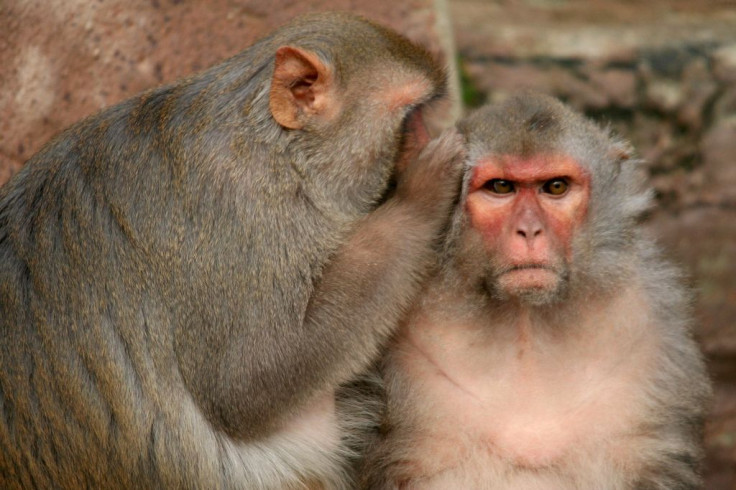Selfish Monkey Brains Keep Track of "Selfless" Acts

Monkeys aren't particularly generous, but a new study revealed that when they do act selflessly, a specific part of their brains keeps count of these kindnesses.
The latest findings, published in the journal Nature Neuroscience, may provide insight into the neural mechanisms underlying normal social behavior in primates and humans. Researchers say that the findings could even further the understanding of developmental disorders like autism, in which social processing in the brain is disrupted.
Researcher Steve Chang and his team from Duke University in Durham, North Carolina, discovered the neuronal generosity tally chart after using electrodes that directly record neuronal activity in three areas of the prefrontal cortex, a brain region involved in social decision-making, in the brains of monkeys as the animals performed reward-related activities.
Scientists gave the monkeys two choices: to drink juice from a tube themselves or to give the juice away to neighbors.
Not surprisingly, monkeys typically kept the juice for themselves. However, when the monkeys were given the choice of giving the juice to the neighbor or neither monkey receiving the juice, the decision-making monkey would frequently choose to give the drink to the other receiving monkey.
In the first experiment, researchers found that two out of the three brain areas being recorded fired neurons.
However, in the second experiment, the third prefrontal cortex area being observed, the anterior cingulate gyrus, which specializes in social decision-making in primates and sits in the same area of the brain as the part associated with the production of feelings of empathy in humans, fired up only when the monkey gave the juice to its fellow primate and observed it being received.
Researchers say that the findings suggest that the neurons in the ACG respond to and record the selfless act at the same time.
"This is the first time that we have had quite such a complete picture of the neuronal activity underlying a key aspect of social cognition. It is definitely a major achievement," says Matthew Rushworth, a neuroscientist at the University of Oxford, according to Nature magazine.
Researchers believe the neuronal activity in the three brain regions observed in the study is essential to normal social behavior in humans, and disruption to any of these areas could contribute to some psychiatric conditions like autistic spectrum disorders.
"The great complexity of human social interactions and the huge variation in what we find rewarding compared with other primates prompts questions about whether the anterior cingulate gyrus operates similarly in the human brain," Matthew Apps and Narender Ramnani, researchers in neuroimaging and human cognition at Royal Holloway, University of London, told Nature.
Experts say that the human brain may have evolved to favor altruistic behavior and empathy-like processes through the development of specific brain regions that experience the reward of others.
"This may have evolved originally to promote being nice to family, since they share genes, and later friends, for reciprocal benefits," says co-author Michael Platt, a neuroscientist from Duke University, according to Nature.



























